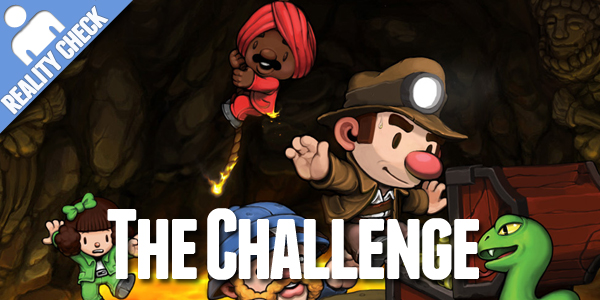
Difficult, difficult, lemon difficult.
This week, I’ve been playing Spelunky. It pisses me off. It pisses me off so much that I have to stop playing because I’m infuriated, it makes me want to throw my controller out the window. Every step is a struggle: it took me three hours to get through the first level.
I can’t stop playing it.
Gamers love a challenge. We’re obsessed with it. Just look at the names of the publications I’ve written for this year: ‘Medium Difficulty‘, ‘Nightmare Mode‘. We love to collect achievements, beat each other’s high scores, brag about how our Street Fighter victories are so severe that they cause real-life injuries to our opponents. That idea of not just winning, but usurping and outmatching, seems intrinsically linked to the gaming psyche. It has been around since scores existed: the score database Twin Galaxies and the brilliant King of Kong show how intense and fascinating these rivalries become. Difficult games are critically acclaimed: the ultra-punishing Dark Souls was one of the best-reviewed games of last year, Spelunky has received widespread praise and Minecraft is a cultural phenomenon.
Here’s the thing, though: I don’t know if I like playing Spelunky. I am compelled to play it in the same way I go to the gym- because it’s a goal to overcome. Yet I don’t like it when I’ve got two dumb bells suspended above my head. I like the satisfaction that comes after the training, but not the event itself. A lot of people don’t see the appeal of a gruelling gym session, just like many gamers don’t see the appeal of Dark Souls and its brutality. One of these enriches both body and mind, letting us experience things we never could have imagined… and the other is Dark Souls. I understand why people are dissuaded from playing tough games, and it’s not just a matter of taste. It’s about how we choose to spend our free time and how we derive enjoyment as individuals. Craig, for example, generally dials back the difficulty so he can enjoy the story- and also because he’s rubbish at games, of course.
I’ve never been a fan of competition. I don’t enjoy multiplayer games unless I’m in a team with my friends, and I never invest the time to improve my skills. I think it stems from my ineptitude in high school sports: every time someone’s taking Halo way too seriously, I find myself back on a rainy rugby pitch, staring at a ball sinking into the mud while the coach and my teammates yell at me. It’s just a fucking game, I would say to myself, because sports mattered much less to me than the video games I’d play alone at home.
The bravado on the pitch extended far beyond it: the sportsmen – Americans might call them ‘jocks’ – were often jerks, competing on everything from astounding feats of bullying prowess to the prestigious title of who could score lowest on a test. High school life was a zero sum game, where your progress up the social ladder was offset by someone less fortunate landing on a snake. I was at the bottom of the ladder: now I simply choose not to play that game, and it’s influenced how I approach online gaming as well.
Just as jocks bully geeks, the geeks in turn now bully the weak. Competitiveness and trash talking isn’t contained in the online arena: it manifests in our attitudes, the way we treat others. Instead of dividing ourselves into teams of Shirts vs Skins and Red vs Blue we get Men vs Women, Straights vs Gays, Us vs Them, distinctions no less artificial and pointless than the colour of your shirt. Anyone who doesn’t meet a level of gaming prowess is branded a loser and disregarded, in the same way the sports coaches disregarded me because I was perceived unfit- although I finished a half marathon last year, so fuck them and their lack of encouragement! I hate people who are unsporting or excessively competitive: campers, organised squads of hitmen and women in online shooters, cheaters sucking the fun out of it all. Most of all, I hate the hatred they create, the bullying and the intimidation.
I used to think that the goal in life was to fit in with other people: to be assimilated into the culture. Anyone can be a member of a crowd, but the real challenge is to stand out in that crowd. It’s much harder to speak out against wrongs than ignore them, much harder to bring people together than to divide them.
Are these arduous gaming goals we set for ourselves a way to make up for the other challenges we choose to ignore in life? We’d rather throw ourselves headfirst at the tedium of Max Payne 3‘s hardest difficulty than tackle a culture that advocates violence against women who try to discuss it. Better to face the caverns of Spelunky than the bowels of misogyny. We see the rugby ball spinning in the mud, and all around us are screaming team mates (the sides were chosen long ago). We don’t want to get our hands dirty until we realise that this match extends beyond the field; this is a game that will play out whether you’re playing or not.
Games are appealing challenges because they offer simple answers: button combinations and dialogue choices. They create the illusion of progress and personal development. Increasingly, I think that challenges with simple answers aren’t worth the sport.
The best of gaming opinion, editorial and iconoclasm every (other) week on Split Screen: it’s Reality Check.





